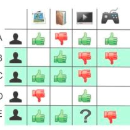A fundamental challenge in emotion research is measuring feeling states with high granularity and temporal precision without disrupting the emotion generation process. Here we introduce and validate a new approach in which responses are sparsely sampled and the missing data are recovered using a computational technique known as collaborative filtering (CF). This approach leverages structured covariation across individual experiences and is available in Neighbors, an open-source Python toolbox. We validate our approach across three different experimental contexts by recovering dense individual ratings using only a small subset of the original data. In dataset 1, participants (n=316) separately rated 112 emotional images on 6 different discrete emotions. In dataset 2, participants (n=203) watched 8 short emotionally engaging autobiographical stories while simultaneously providing moment-by-moment ratings of the intensity of their affective experience. In dataset 3, participants (n=60) with distinct social preferences made 76 decisions about how much money to return in a hidden multiplier trust game. Across all experimental contexts, CF was able to accurately recover missing data and importantly outperformed mean imputation, particularly in contexts with greater individual variability. This approach will enable new avenues for affective science research by allowing researchers to acquire high dimensional ratings from emotional experiences with minimal disruption to the emotion-generation process.
翻译:情感研究中的一项根本挑战是测量高颗粒度和时间精确度的感知状态,同时不影响情感生成过程。在这里,我们引入并验证一种新的方法,即对答复进行稀少抽样,并使用称为协作过滤的计算技术(CF)来回收缺失的数据。这种方法利用了个人经历结构化的共变,在开放源代码 Python 工具箱Nieghbors中可以找到。我们通过仅使用原始数据中的一小部分恢复密集的个人评级,验证了我们跨越三个不同实验环境的方法。在数据集1中,参与者(n=316)分别对6种不同感知情绪中的112个情感图像进行了评级。在数据集2中,参与者(n=203)观看了8个短短的感动自传故事,同时提供其影响经历强度的逐刻度分级。在数据集3中,参与者(n=60)有着明显的社会偏好,就隐藏的倍增信任游戏中返回多少钱作出了76项决定。在所有实验环境中,CFFFC能够准确恢复缺失的数据,而重要的是,特别是从个人变异性更强的背景中,特别是从个人变异性背景中,使高度研究获得新的情感冲击性研究获得新的途径。





